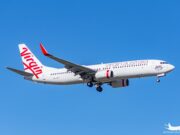Like competitors Delta Air Lines and American Airlines, Alaska Airlines also plans to impose restrictions on so-called “smart bags” or “smart luggage” in early 2018.
As of Jan. 15, bags equipped with a lithium battery or lithium battery power bank will only be accepted as carry-on baggage if it is possible to remove the battery from the bag if needed, Alaska said. If the bag is to fly as checked baggage, the battery must be removed and carried in the passenger cabin. “If it’s not possible to remove the battery from the bag, the bag won’t be allowed on the plane,” the carrier said in a message posted on its website.
American and Delta also have announced similar restrictions, and other carriers are expected to do so as well. Alaska said its new policy follows the U.S. Federal Aviation Administration’s (FAA’s) general rules regarding lithium ion batteries and also the growing concern of the airline industry “around these batteries in our cargo areas.”
FAA guidance says that lithium metal and lithium ion batteries are allowed in carry-on baggage and in checked baggage as long as they are protected from damage and short circuit or installed in a device, and that battery-powered devices must be protected from accidental activation. Spare lithium ion, metal and polymer batteries, including external battery packs, are prohibited from checked baggage, according to FAA.
The batteries in smart bags power the electronic lock, bag-weighing and global positioning systems features of many smart bags, but the batteries also are used for recharging personal electronic devices, like smartphones, laptops and tablets. Because the batteries are used to charge other devices, they are considered spares or power banks.
In an emailed statement, Tomi Pierucci, CEO and co-founder of smart bag maker Bluesmart, said: “The latest changes are an absolute travesty and [are] a huge step back not only for travel technology, but it also presents an obstacle to streamlining and improving the way we all travel. There is no validity to the claims, at least not with regard to Bluesmart batteries causing fires. All our products meet DOT [Department of Transportation], FAA, FCC [Federal Communications Commission] and UN 38.3 regulations and all our batteries are tested, certified, and in compliance.”
UN/DOT 38.3 refers to section 38.3 of the UN Manual of Tests and Criteria, which lays out a testing protocol designed to ensure the safety of lithium batteries during shipping.
“If they are going to ban smart bags, then they should be banning cameras, laptops, and phones being checked in or carried on,” Pierucci said. “All of these have at some point caused issues with exploding batteries, and yet it is smart bags and Bluesmart that [are] getting punished for this.
Mike Tobin, Alaska’s manager of dangerous goods, said, “We love innovation and understand why smart bags are so appealing for travel. While these restrictions may pose a challenge to some of our guests, there have been no incidents to date with smart bags on airplanes and we want to keep it that way. As this technology continues to evolve, we will work with the industry and our partner airlines to evaluate all safety policies and provide clear guidance regarding the safe use of smart bags.”


